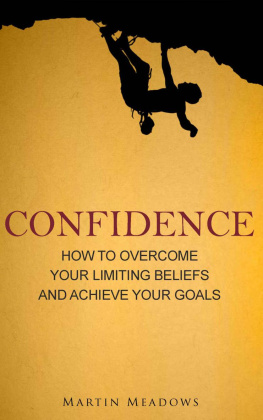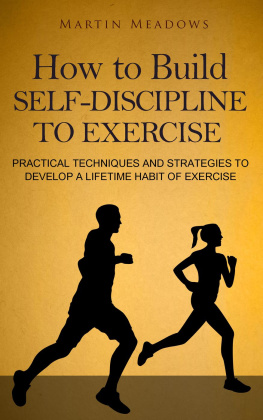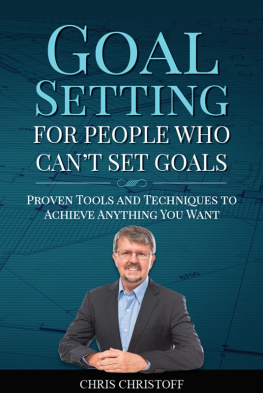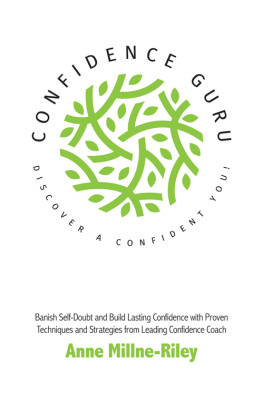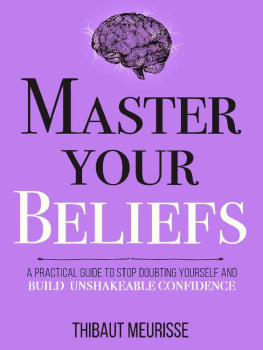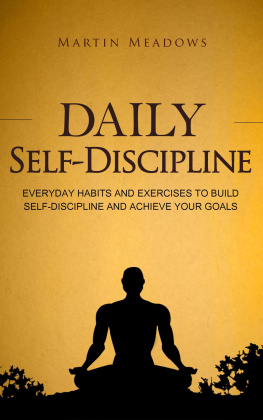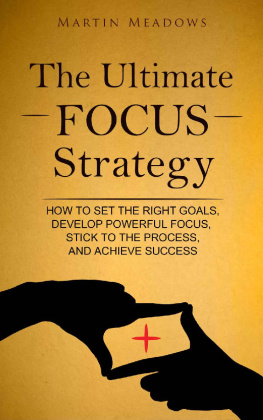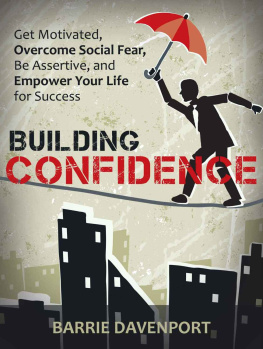Meadows - Confidence: How to Overcome Your Limiting Beliefs and Achieve Your Goals
Here you can read online Meadows - Confidence: How to Overcome Your Limiting Beliefs and Achieve Your Goals full text of the book (entire story) in english for free. Download pdf and epub, get meaning, cover and reviews about this ebook. year: 2015, publisher: Meadows Publishing, genre: Religion. Description of the work, (preface) as well as reviews are available. Best literature library LitArk.com created for fans of good reading and offers a wide selection of genres:
Romance novel
Science fiction
Adventure
Detective
Science
History
Home and family
Prose
Art
Politics
Computer
Non-fiction
Religion
Business
Children
Humor
Choose a favorite category and find really read worthwhile books. Enjoy immersion in the world of imagination, feel the emotions of the characters or learn something new for yourself, make an fascinating discovery.
Confidence: How to Overcome Your Limiting Beliefs and Achieve Your Goals: summary, description and annotation
We offer to read an annotation, description, summary or preface (depends on what the author of the book "Confidence: How to Overcome Your Limiting Beliefs and Achieve Your Goals" wrote himself). If you haven't found the necessary information about the book — write in the comments, we will try to find it.
Confidence: How to Overcome Your Limiting Beliefs and Achieve Your Goals — read online for free the complete book (whole text) full work
Below is the text of the book, divided by pages. System saving the place of the last page read, allows you to conveniently read the book "Confidence: How to Overcome Your Limiting Beliefs and Achieve Your Goals" online for free, without having to search again every time where you left off. Put a bookmark, and you can go to the page where you finished reading at any time.
Font size:
Interval:
Bookmark:
Confidence
How to Overcome Your Limiting Beliefs
and Achieve Your Goals
By Martin Meadows
Download another Book for Free
I want to thank you for buying my book and offer you another book (almost two times longer than this book), Grit: How to Keep Going When You Want to Give Up , completely free.

Click the link below to receive it:
http://www.profoundselfimprovement.com/selfefficacy
In Grit , Ill share with you how exactly to stick to your goals according to peak performers and science.
In addition to getting Grit , youll also have an opportunity to get my new books for free, enter giveaways and receive other valuable emails from me.
Again, heres the link to sign up:
http://www.profoundselfimprovement.com/selfefficacy
Table of Contents
Extended table of contents is available at the end of the book.
Prologue
Nobody doubts that setting goals is one of the most important keys to making life changes, regardless of whether theyre big, audacious goals, or just small adjustments.
Yet, while most of us have no problems identifying goals we want to accomplish, putting these plans into action is frequently much more difficult than we think.
A lack of self-discipline and motivation contribute to this behavior. However, theres another lesser-known reason why some people struggle to make changes in their lives.
Its their low self-efficacy.
Individuals who dont possess much self-efficacy have a hard time putting their plans into action and following through because deep down they dont believe they can achieve them.
You dont even have to be aware you exhibit behavior common among people with low self-efficacy, yet it can dramatically affect your life.
What are the main four factors that affect your self-efficacy? How can you develop more confidence in your abilities? What are the most important things you need to know about the influence of your mind on your achievements?
These are some of the questions Ill answer in this short book. The advice youre about to read is based both on scientific research and my personal experience.
Instead of delving deep into the details, I will share fundamental knowledge that will make the most difference in your life.
My goal is to help you understand how to develop more confidence in your abilities and avoid the most common dangers associated with low self-efficacy.
Lets start with explaining in more detail what self-efficacy is.
Chapter 1: What Is Self-Efficacy?
Self-efficacy is the strength of your beliefs in your ability to complete tasks successfully. It determines things such as:
- whether you will persist or give up while working on a specific task,
- how long you will stick to uncomfortable changes designed to bring long-term results (diet, workout regimen),
- what goals youll set for yourself and where extremely difficult ends and impossible starts.
The beliefs you have about your abilities shape your entire life. They affect how you think, feel, and behave. If you have little self-efficacy, youll have a tendency to write off things you consider impossible. As a result, for the sole reason you dont believe youre able to achieve your dreams youll live a mediocre life instead of realizing your full potential.
Its important to note that self-efficacy is task-related. You can have high self-efficacy when driving a car and low self-efficacy when working on your business.
However, high self-efficacy in specific tasks indirectly translates to higher self-efficacy in other areas (for the reason well discuss in the second chapter). In other words, high self-efficacy in one area will help you start with the right mindset in another area of your life.
You Can Improve Your Self-Efficacy Even as an Adult
General self-efficacy develops during childhood. The right teacher can help her students develop a powerful belief in their abilities that will empower them in their adult life.
However, nothing is lost for the rest of the people who havent developed a strong sense of self-efficacy when they were young.
There are ways to develop self-efficacy as an adult, and thats what were going to focus on in this book. Put away the past and lets focus on what we can do about it now.
People with a Strong Sense of Self-Efficacy vs. People with a Weak Sense of Self-Efficacy
Here are five common characteristics of people with a strong sense of self-efficacy:
1. They consider challenges as something they can overcome and master.
2. They persevere in the face of difficulties. Obstacles dont make them lose confidence in their abilities.
3. They take responsibility for their failures and believe they control the outcome (i.e., they dont believe in getting lucky).
4. They put more effort into completing a task, which in turn makes them more likely to achieve it.
5. They commit to their goals and develop a deeper understanding of how to achieve them.
And here are five common characteristics of people with a weak sense of self-efficacy:
1. They avoid challenges. Consequently, they rarely (if ever) grow.
2. They believe that difficult goals are beyond their capabilities, and thus they dont set them, and dont achieve big wins.
3. They quickly lose confidence in their abilities and give up on their goals.
4. They tend to take a narrow view of the task and focus on the surface instead of the underlying principles.
5. They dont believe that their actions and decisions make a difference in their life (instead, they believe in external factors like luck).
When I was a shy person with low self-efficacy, I avoided every situation that might have been uncomfortable. My self-confidence soared only when I decided to challenge myself.
These small challenges added up to small wins, which led to big wins. By breaking one behavior that prevented me from developing confidence in my abilities, Ive changed my life.
How Self-Efficacy Affects Your Life
The Galatea effect is a type of a self-fulfilling prophecy that makes our self-expectations largely determine our performance. As a result, low self-efficacy can dramatically lower your chances of achieving personal success.
If you dont believe in your abilities, you arent likely to set big goals that have the highest chance of making a dramatic improvement in your life. Since you also doubt in your ability to achieve success, you wont do your best (why invest effort in something thats not going to work out, anyway?). On the other hand, if you possess a strong sense of self-efficacy, you constantly set the bar higher and higher and improve yourself on a daily basis.
One area where its easy to notice this phenomenon is in your career. People who dont believe in their abilities (even if they possess unique and valuable skills) are less likely to apply for better-paid jobs and develop their career.
A small business owner who believes her bakery is the pinnacle of her career wont develop a chain of bakeries, even if shes given an opportunity to do so. Her beliefs will either prevent her from taking action at all, or they will sabotage her later on.
Aside from achievement, the influence of self-efficacy is most visible when youre making health-related decisions.
Your self-efficacy can affect if youre going to keep smoking or quit, start exercising three times per week or live a sedentary lifestyle, or eat healthy or wolf down junk food. In fact, increasing your self-efficacy is one of the best ways to help you stick to your workout regimen.
Since people with low self-efficacy think that many goals are outside their reach, they may never come around to stop smoking. And if they decide to make a change, a low level of self-efficacy will result in expending little effort and little to no perseverance when faced with obstacles.
Next pageFont size:
Interval:
Bookmark:
Similar books «Confidence: How to Overcome Your Limiting Beliefs and Achieve Your Goals»
Look at similar books to Confidence: How to Overcome Your Limiting Beliefs and Achieve Your Goals. We have selected literature similar in name and meaning in the hope of providing readers with more options to find new, interesting, not yet read works.
Discussion, reviews of the book Confidence: How to Overcome Your Limiting Beliefs and Achieve Your Goals and just readers' own opinions. Leave your comments, write what you think about the work, its meaning or the main characters. Specify what exactly you liked and what you didn't like, and why you think so.

